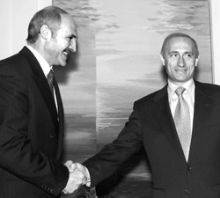On May 23, the Minsk summit of the five CIS customs-union states revealed deep differences between Russia, on the one hand, and its allies — Belarus, Kazakhstan, Kyrgyzstan, and Tajikistan which joined them later, on the other.
The allies demand obeying the rules Boris Yeltsin approved establishing down the same rail fares as in Russia and tax payments in the country which receives goods. The factual implementation of this political declaration means serious budgetary losses for Russia, the largest exporter of gas, oil, and electricity. Presidents Aliaksandr Lukashenka of Belarus and Nursultan Nazarbayev of Kazakhstan said on the summit eve that the position of Russia, the only Customs Five country that has not ratified the free trade area agreement, puts the whole Commonwealth on the brink of disintegration.
“Russia is the only country that has not ratified the agreement. If the free trade area fails to be created, we will come to the brink of disintegration of the Commonwealth... If we do nothing in the economy, then what are able to do in general?” said Mr. Lukashenka after talks with Mr. Nazarbayev who had arrived in Minsk on a three-day official visit. The Belarus president said with his usual straightforwardness that he expected Vladimir Putin to say either yes or no.
“Frankly, the documents finalized for this summit do not have what is needed, the agreement on a free trade zone. And this is the main issue,” added Mr. Nazarbayev who heads the Customs Union comprising Belarus, Kazakhstan, Kyrgyzstan, Tajikistan, and Russia.
To compensate for its economic intransigence, Moscow is offering its allies a military umbrella in the form of a system of collective security, now existing only on a bilateral basis with the Kremlin, which can now be laid as a real basis for an alliance under Moscow’s aegis and adapted to the interests of each.
“Above all, we should form groupings: Russia-Belarus, Russia-Kazakhstan, Russia-Kyrgyzstan, and so on. They will lay the groundwork for a regional system of security, and only then can we speak about the formation of rapid-deployment forces. The heads of state can decide on this at the summit,” Vladimir Zemsky, General Secretary of the CIS Security Council, told Belarusian state-run television before the meeting.
According to Mr. Zemsky, the heads of state will consider at this summit a memorandum aimed at reorienting the security system from the original concept of foreign aggression to new problems such as terrorism.
The week before last, Zemsky met Belarusian President Lukashenka, who explained that the West had misunderstood his statement about a 300,000 strong Belarusian-Russian military grouping which would only be set up under the threat of direct aggression. Mr. Lukashenka also commented negatively on NATO plans to expand its presence in Poland, Hungary, and the Czech Republic.
“The collective security treaty, in contrast to a strictly- structured NATO, is an open treaty. Its main weapon is consultations,” Zemsky said on May 23. He also added that later, as the collective security system is structured, the bilateral military and political treaties could lay a foundation for forming collective peacekeeping forces to engage in actions both within and outside the framework of the Commonwealth under United Nations aegis.
Journalists call what is going on in Minsk “the week of high politics.” It ended with the meeting of Mr. Lukashenka and Leonid Kuchma in Viskuli, a historic place in Bela Vezha Forest, which saw the signing of the agreements to dissolve the USSR and form the CIS.







